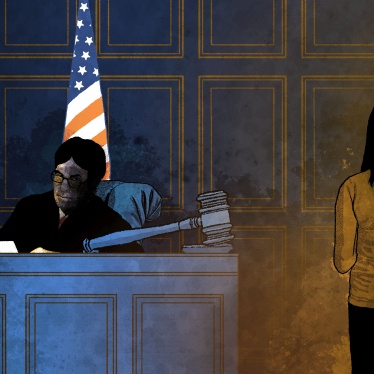Human Rights Watch joined religious, legal, and civil rights organizations to oppose the provisions in S. 489/ H.R.1229, recently introduced by Senator Lamar Alexander (R-TN) and Representative Roy Blunt (R-MO). If passed, this legislation would eliminate consent decrees, which have long served as an important vehicle for protecting the human rights of prisoners and others, who might be suffering from state and local government abuses.
On behalf of the undersigned organizations, we write to urge you to oppose the Federal Consent Decree Fairness Act (), If enacted, this bill would eviscerate a crucial means of resolving meritorious claims involving state and local governments without expensive and time-consuming litigation. In addition, the proposed legislation would impose grossly unfair burdens on the federal government, the federal courts, and beneficiaries of a wide array of federal protections in areas such as environmental, consumer, health care, and civil rights laws.
On behalf of the undersigned organizations, we write to urge you to oppose the Federal Consent Decree Fairness Act (S. 489/ H.R.1229), recently introduced by Senator Lamar Alexander (R-TN) and Representative Roy Blunt (R-MO). If enacted, this bill would eviscerate a crucial means of resolving meritorious claims involving state and local governments without expensive and time-consuming litigation. In addition, the proposed legislation would impose grossly unfair burdens on the federal government, the federal courts, and beneficiaries of a wide array of federal protections in areas such as environmental, consumer, health care, and civil rights laws.
The Proposed Legislation Would Virtually Eliminate Consent Decrees Involving State and Local Governments
The Federal Consent Decree Fairness Act allows a state or local government to file a motion to vacate or modify a consent decree four years after the decree is entered or after the election of a new state or local official. Under the legislation, a consent decree will lapse if the federal court overseeing the decree does not rule on this issue within 90 days. The bill’s language creates an ominous situation for federal and private plaintiffs, who could be required to re-prove their entire case every four years or every time the voters elect a new administration. In addition, the 90-day period for a court to issue a ruling would place undue pressure on an already overburdened federal judicial system. The legislation would also punish plaintiffs unjustly if a federal court is unable to issue a decision within the 90-day period.
The proposed bill would eliminate the value and effectiveness of consent decrees by restricting the ability of the litigating parties to enter into settlement agreements. Under the proposed legislation, at the time a defendant moves for dissolution or modification of a consent decree, a plaintiff can keep the decree in place only by showing that his or her federal rights continue to be violated. This burden of proof provision—which reverses decades of existing law that places the burden on the defendants—creates an additional disincentive for plaintiffs to settle because plaintiffs, knowing that they will be effectively forced to prove their case at trial on the merits after either four years or a change in administration, will justifiably question what benefits they will receive through consent decrees. The proposed bill also provides defendants with a new incentive to “run out the clock.” Rather than encouraging litigants to enter into voluntary, enforceable settlements, the bill almost compels plaintiffs to go to trial so that they may obtain litigated judgments that cannot be so easily modified. By creating disincentives to settle and forcing matters to contested litigation, the bill will further clog federal courts.
Moreover, with many consent decrees, a four-year time limit is a woefully inadequate period to correct the history of government practices or policies that created the harm. In many cases, the ability to fulfill the terms of a consent decree within the artificial time period imposed by the bill may either be impossible to achieve, or, require drastic steps that would not be desirable to the defendants or the plaintiffs.
The Proposed Legislation Purports to Fix a Problem That Does Not Exist
Existing federal law already permits the modification and dissolution of consent decrees. The courts currently apply a generous and flexible standard for allowing state and local governments to modify or terminate existing consent decrees. A party need only show that a significant unanticipated change in circumstances warrants revision of the decree. Examples of changed circumstances include a change in underlying law, when the goals of the consent decree have been achieved or when a consent decree proves to be detrimental to the public interest.
S. 489/H.R. 1229 inappropriately seeks to overturn Frew v. Hawkins, a recent unanimous decision by the U.S. Supreme Court that affirms flexible, common-sense standards for administering consent decrees involving state and local governments.1 In Frew, the U.S. Supreme Court noted, “If the State establishes reason to modify the decree, the court should make the necessary changes; where it has not done so, however, the decree should be enforced according to its terms.”2 The Supreme Court emphasized in Frew that state and local governments have a court remedy that allows them to modify or terminate a consent decree when a significant change in circumstances has occurred.
The Proposed Legislation Would Affect a Wide Range of Litigation and Have a Damaging Effect on Many Communities
The bill would affect most litigation brought by the U.S. Department of Justice (DOJ) against state and local governments, as well as litigation brought by private parties. For example, it would allow local governments to avoid implementation of consent decrees that govern long-standing and productive efforts by the DOJ to bring water, sewage, and air pollution control systems into compliance with federal environmental standards. The bill would complicate current and future efforts to ensure that billions of dollars in federal funds for transportation, economic development, and other programs are spent in conformance with applicable requirements specified by Congress. Enforcement of the Voting Rights Act would be very burdensome. The bill would also impact discrimination cases involving employment, housing, health care, state and local hospitals, universities, or other institutions that receive federal Title VI and Title IX funding and adversely affect agreements that have been protecting children’s health, safety, and education for years. Indeed, the bill would negatively affect a wide spectrum of cases brought to secure federal rights in federal court against state and local governments.
The bill, if enacted, would potentially result in the dissolution of the following constructive consent decrees:
- United States of America v. City of Los Angeles3—consent decree entered following a DOJ investigation of allegedly widespread police corruption, including brutality and planting of evidence, in the Rampart Division of the Los Angeles Police Department. The decree, which was negotiated in 2000 and entered in 2001, creates procedures for, among other things, insuring that those arrested are examined for injuries (para 73) and that citizens have a viable mechanism for filing complaints against the LAPD (para 74). James Hahn was the City Attorney at the time decree was entered, and then became the Mayor of Los Angeles. Thus, if S. 489/H.R. 1229 were law, the City could now seek relief from the decree while offering no evidence that anything has changed since it agreed to the decree.
- United States v. Mercer County, NJ4—earlier this year, DOJ entered into a consent decree to settle a case it brought against a county-run nursing facility under the Civil Rights of Institutionalized Persons Act, for alleged gross violations of the standards of care and responsibility expected of those caring for the elderly and disabled. DOJ entered into a consent decree with the county designed to put in place sufficient staffing and attention to insure that those in the county’s custody received the level and quality of care required by several federal statutes, including the Medicare and Medicaid Acts. Both sides declared that they were entering into the consent decree to avoid “protracted litigation.” If S. 489/H.R. 1229 were to become law, the county could have the decree vacated as soon as there is a change in county administration, thus exposing the elderly and disabled in its care to renewed danger while the federal government sought to once again prove its case.
- United States and League of Women Voters of New Orleans, et al. v. Sewerage & Water Board of New Orleans, et al.—consent decree growing out of a suit5 by DOJ under the Clean Water Act for modernization of an antiquated sewage collection system that spewed raw sewage onto city streets. The long-term clean-up commitment by the City could be severely compromised by this legislation.
Contrary to views of the bill’s supporters, consent decrees are an efficient means for willing parties to enter into a carefully negotiated agreement without litigation. Consent decrees reflect the litigating parties’ reasoned judgment that a consensual resolution is preferable to full-blown litigation. The Federal Consent Decree Act misrepresents the consensual nature of consent decrees and the well-established legal precedent on the practicality and efficiency of this settlement tool. Consistent with this precedent, federal courts currently apply a reasonable and flexible standard when asked to modify or dissolve consent decrees. Congress should not enact legislation simply to correct what some perceive as a few onerous consent decrees. Therefore, we urge you to oppose this bill and any similar amendments.
Sincerely,
David Certner, Director of Federal Affairs
AARP
Benjamin Wolf, Associate Legal Director
ACLU of Illinois
Ramona Ripston, Executive Director
ACLU of Southern California
Janis Spire, Executive Director
Alliance for Children's Rights
Nan Aron, President
Alliance for Justice
Helena R. Berger, Chief Operating Officer
American Association of People with Disabilities
Laura W. Murphy, Director
American Civil Liberties Union – Washington Legislative Office
Scott Barstow, Director of Public Policy and Legislation
American Counseling Association
Barry Lynn, Executive Director
Americans United for Separation of Church and State
Janna Starr, Director of Disability Rights, Family and Technology Policy
The Arc and United Cerebral Palsy Disability Policy Collaboration
Lewis Golinker, Esq., Director
Assistive Technology Law Center – Ithaca, NY
Robert Bernstein, Ph.D., Executive Director
Bazelon Center for Mental Health Law
Tom Gerety, Executive Director & Brennan Center Professor
Brennan Center for Justice at New York University School of Law
Robin G. Steinberg, Executive Director
The Bronx Defenders
Terri L. Stangl, Executive Director
Center for Civil Justice
Patricia B. Nemore, Senior Policy Attorney
Center for Medicare Advocacy, Inc.
Robert C. Fellmeth, Executive Director
Children's Advocacy Institute
Miriam Krinsky, Executive Director
Children's Law Center of Los Angeles
Susan L. Gates, General Counsel
Children's Defense Fund
Marcia Robinson Lowry, Executive Director
Children's Rights
Shirley Bergert, Public Benefits Task Force Director
Connecticut Legal Services, Inc.
Philip Warburg, President
Conservation Law Foundation – Boston
Philip Fornaci, Executive Director
DC Prisoners Legal Services, Inc
Rodger Schlickeisen, President
Defenders of Wildlife
James Cox, Legislative Counsel
Earth Justice
Craig B. Futterman, Associate Clinical Professor of Law
Edwin F. Mandel Legal Aid Clinic – University of Chicago Law School
Alexandra K. Finucane, Esq.,VP of Legal and Government Affairs
Epilepsy Foundation
Robert Sable
Greater Boston Legal Services, Inc.
Greg Bass , Litigation Director
Greater Hartford Legal Aid – CT
Anne Erickson, Executive Director
Greater Upstate Law Project/
Public Interest Law Office of Rochester – Albany, NY
Jamie Fellner, Director U.S. Program
Human Rights Watch
Sara Weinstein, Low-income Access Project Coordinator
The Institute for Reproductive Health Access
Robert Rubin, Legal Director
Lawyers' Committee for Civil Rights of the San Francisco Bay Area
Barbara Arnwine, Executive Director
Lawyers’ Committee for Civil Rights Under Law
Wade Henderson, Executive Director
Leadership Conference on Civil Rights
Lisalyn R. Jacobs, Vice President for Government Relations
Legal Momentum (formerly NOW Legal Defense)
Kenneth Schorr, Executive Director
Legal Services of Southern Piedmont – Charlotte, NC
Michael Ferrera, Executive Director
LifeWorks Mentoring –W. Hollywood, CA
Barbara Lott-Holland, Co-Chair
Los Angeles Bus Riders Union
Eric Mann, Director
Los Angeles Labor/Community Strategy Center
Cyn Yamashiro, Director
Loyola Law School Center for Juvenile Law and Policy
Gary Weston, Executive Director
Maryland Disability Law Center
Allan Rodgers, Executive Director
Massachusetts Law Reform Institute
James Preis, Executive Director
Mental Health Advocacy Services, Inc – Los Angeles
Ann Marie Tallman, President & General Counsel
Mexican American Legal Defense and Educational Fund
Hilary O. Shelton, Director
NAACP Washington Bureau
Karen K. Narasaki, President and Executive Director
National Asian Pacific American Legal Consortium
Kathleen H. McGinley, Ph.D., Deputy Executive Director for Public Policy National Association of Protection and Advocacy Systems
Elizabeth J Clark, PhD, ACSW, Executive Director
National Association of Social Workers
Patrick Gardner, Deputy Director
National Center for Youth Law
John Lancaster, Executive Director
National Council on Independent Living
Janet Murguia, President and CEO
National Council of La Raza
Marissa M. Tirona, Program Director
National Employment Lawyers Association
Shanna L. Smith, President and CEO
National Fair Housing Alliance
Laurence Lavin, Director
National Health Law Program, Inc.
Michael Avery, President
National Lawyers Guild
Don Saunders, Director of Civil Legal Services
National Legal Aid & Defender Association
Debra Ness, President
National Partnership for Women & Families
Simon Lazarus, Public Policy Counsel
National Senior Citizens Law Center
Stephanie J. Jones, Executive Director
National Urban League Institute for Opportunity and Equality
Dina Lassow, Senior Counsel
National Women’s Law Center
Karen Wayland, Legislative Director
Natural Resources Defense Council
Patricia Kaplan, Executive Director
New Haven Legal Assistance Association
Ralph G. Neas, President
People For the American Way
Philip Tegeler, Executive Director
Poverty & Race Research Action Council
Don Specter, Director
Prison Law Office – California
Paul Wright, Editor
Prison Legal News
Karen L. Murtagh-Monks, Litigation Coordinator
Prisoners' Legal Services of New York
Joan Claybrook, President
Public Citizen
Debra Gardner, Legal Director
Public Justice Center – Baltimore
Paul Freese, Jr., Director of Litigation & Advocacy
Public Counsel – Los Angeles
Cesar Perales, Executive Director
Puerto Rican Legal Defense & Education Fund
Rabbi David Saperstein, Director and Counsel
Religious Action Center of Reform Judaism
Meredith Dodson, Director of Domestic campaigns
RESULTS
J. Richard Cohen, President & CEO
Southern Poverty Law Center
Javier N. Maldonado, Executive Director
Texas Lawyers' Committee for Civil Rights
Scott Cummings, Acting Professor of Law
UCLA School of Law
Jeremy Chwat, Director of Public Policy
United Spinal Association
(formerly Eastern Paralyzed Veterans Association)
Belinda Belcher, Executive Director
Uptown People's Law Center – Chicago
Helen Gonzales, Policy Director
USAction
Deborah Stein, Director of Federal Policy and Advocacy
Voices for America's Children
Timothy Stoltzfus Jost, Robert L. Willett Family Professor
Washington & Lee University School of Law
Eve Hill, Executive Director
Western Law Center for Disability Rights
Melissa Josephs, Director of Equal Opportunity Policy
Women Employed – Chicago
Kimberly Lewis, Staff Attorney
Western Center on Law and Poverty
[1]Frew v. Hawkins, 540 U.S. 431 (2004).
[2]Id. at 442.
[3](C.D. Cal. - no case number given), at http://www.lapdonline.org/pdf_files/boi/final_consent_decree.pdf.
[4](D.N.J.) (consent decree at http://www.usdoj.gov/crt/split/documents/split_mercer_settle_2_17_05.pdf).
[5]United States and League of Women Voters of New Orleans, et al. v. Sewerage & Water Board of New Orleans, et al., Civil Action No. 93-3212, 63 Fed. Reg. 26825-26826 (May 8, 1998).







